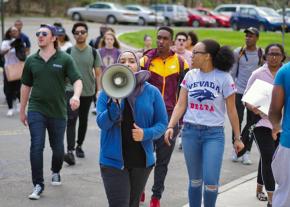Protesting blue-light surveillance
reports on a sit-in at Binghamton University against the administration's plan to fund increased security off campus.
STUDENTS BEGAN a sit-in at Binghamton University's administration offices April 27 to demand that the university reverse its plan to devote resources to the expansion of street cameras and "blue light" call boxes, like those found on campus, to the city of Binghamton.
Some 40 students at the upstate State University of New York (SUNY) campus have occupied the Couper Administration Building for over a week now, renaming it the "People's Administration Building." The administration closed down the building instead of meeting with students.
Activists in the Frances Beal Society (FSB)--an organization named after a well-known Binghamton activist--say that university's allocation of $1 million to add "blue light" cameras and call boxes to the downtown bar district will only aid Binghamton's police department, which they say has a "history of terrorizing Black and Brown people."
The students also point out that the area where the cameras are supposed to go happens to be in an area where Binghamton Mayor Rich David, one of the main proponents of the initiative, owns a quarter of the property. They say the plan will help drive up the downtown property values, benefiting David.

The administration is using funds that are supposed be used for programs that support community advancement--sit-in organizers say the money would be better spent on programs that truly help the community tackle some of its most pressing issues, such as poverty, education, the opioid epidemic or mental health issues.
Activist Gabreélla Friday explained that extending "blue lights" to the downtown area was really just an attempt to "expand the 'broken windows policing' policies, which exacerbates mass incarceration and structural inequalities."
Protesters are demanding that the college administration not devote any resources to support the blue-light initiative in the city of Binghamton, and that no funds originating within the university, now or in the future, will go toward policing and surveillance in the city.
They are also demanding community control of these resources through a process of public town halls, which would include community members, community organizations, students and a representative from the administration. The decision to spend this money on expanding police control of the community was made behind closed doors and without input from the majority of students or the community.
"This is a complicated issue, because we are organizing for more democracy, accountability and community control of our resources," said FSB member Toivo Asheeke, "but our numbers have grown as the days go on."
Since their occupation began, the FBS has gained support from the Graduate Student Organization, the Student Association, Justice and Unity for the Southern Tier and other campus organizations. After speaking with protesters, the student group that first proposed the blue-light city expansion was convinced to withdraw support for the initiative.
THE FRANCES Beal Society was started at the beginning of the school year and is an outgrowth of the Black Lives Matter movement and the growing resistance to the Trump administration.
These activists see this fight as part of a broader one against injustice, and view many of society's problems as institutional.
"We don't focus only on Trump," said Toivo. "Things were bad before and will be bad after. We are fighting a corrupt system. We are fighting the privatization of the public university system. We are fighting the lack of democracy and lack of community control."
Rachelle Jereza went on to explain how the fight will continue even if the students win their demands in this struggle. FBS aims, according to Jereza, to "connect student activists with activists from the community, so they can learn from each other and join forces to fight against the gentrification of Binghamton, fight for social justice, and stand up for people of color, LGBTQIA+ people, and undocumented immigrants."
Right now, the FBS is looking to shed light on this issue and gain active support for their struggle from students at colleges across the country and from anybody who is willing to stand in solidarity with them.
They're looking for students at other campuses to put pressure on their own administrations to openly support FBS's struggle, and to get their administrators to send letters and e-mails to President Harvey Stenger, Provost Donald Nieman and Vice President of Student Affairs Brian Rose telling them to accept the FBS's demands. Individual letters are also appreciated.


